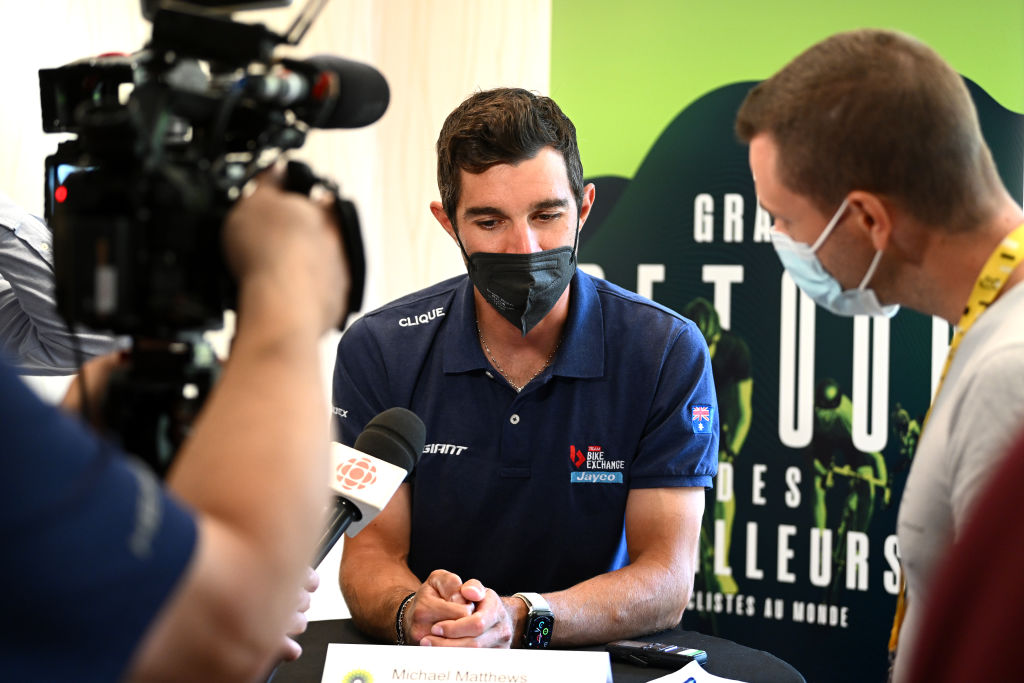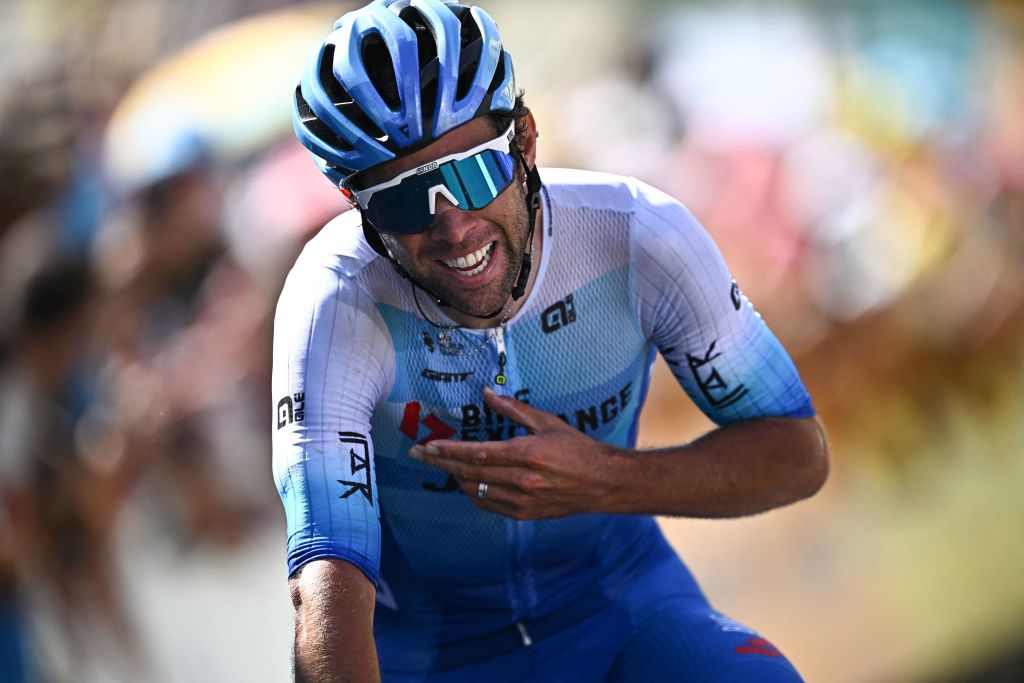Michael Matthews - I dream about the rainbow jersey every night
Australian aiming at second gold on home soil after U23 title in 2010

It's every rider's dream: winning the UCI Road World Championships and wearing the rainbow jersey. For Michael Matthews, the elite men's road race in Wollongong, Australia will be the chance to live that dream for a second time, 12 years after claiming the under-23 title in Geelong.
In 2010, the elite races were dominated by now-retired riders like Thor Hushovd, Matti Breschel, and the Australian bronze medalist Allan Davis. In the under-23s, Matthews prevailed over John Degenkolb and Guillaume Boivin.
Now, Matthews heads into a home elite world championships as the obvious leader for Australia and has big dreams of racing next season in the rainbow jersey. He barely got to wear the jersey after his U23 victory as he turned professional the next season with Rabobank.
"Yeah, we'll definitely be doing everything we can to get the stripes but it's going to be a war and I'm excited to take up the challenge obviously," Matthews told Cyclingnews before racing the Maryland Cycling Classic.
"It's something I dream about every single night, fighting for that jersey. I think having the team around that we have this year and being in Australia, it's going to be very special."
In the dozen years since his last world title, Matthews has had his share of ups and downs. He's won four stages of the Tour de France, two stages of the Giro d'Italia, and three in the Vuelta a España. He's also had a long spell of struggles during his four years with Team Sunweb, was shut out of the team's Tour de France roster in 2020 and then agreed with the team to terminate his contract prematurely.
In that time, he's also grown as a rider and this year, with pure sprinter Dylan Groenewegen joining BikeExchange-Jayco, Matthews has been able to race aggressively, and that was how he earned his first Tour de France stage win in five years from a breakaway.
Get The Leadout Newsletter
The latest race content, interviews, features, reviews and expert buying guides, direct to your inbox!
"Honestly, I've been wanting to race like that for a very long time," Matthews said. "When I was a kid, this is how I would race – I would be the kid attacking all day and just trying to make everyone else around me tired, and then go for the sprint. But I was never a rider that really liked to sit in the peloton all day and do a sprint in the final. That never made me happy."
However, with a victory in the points classification in the 2017 Tour de France, Matthews was expected to be the protected sprinter for Sunweb. But he crashed out of the 2018 Tour and went winless in 2019 before being left off Sunweb's Tour team in 2020.
Matthews said that the label of sprinter was not what he wanted to have in front of his name.
"It never made me motivated to race like that and being pigeonholed into being a sprinter for the majority of my career. Let's just say it's not the rider that I wanted to be. But I was always told that that's the best way to win – the best opportunity to win the maximum amount of races in the year and that was the way my career was going.
"I was quite successful in that area of cycling. Our sport is about wins. It's not necessarily about the show. I understand that we obviously get paid to win races. But at the same time, I wasn't super happy in that being pigeonholed as that sort of rider."
The magic moment
After ending his contract with Sunweb, Matthews came back to the Australian WorldTour outfit, BikeExchange-Jayco, where he spent four of his first six years as a professional. There he was given more freedom to mould himself into a different type of rider.
"They've really been asking me what sort of rider I want to be. I want to be more of this aggressive rider that's making a race rather than just following or just waiting for the sprint. And I think it was always quite difficult to find a situation where I could use those skills."
After a disastrous start to his Classics campaign, where he went down in a huge crash sparked by high winds and needed stitches, the magic moment finally came during the Tour de France. After two near-misses on stages 6 and 8 where he was upstaged by Tadej Pogačar (UAE Team Emirates) and Wout van Aert (Jumbo-Visma), respectively, in reduced sprints, he set his sights on stage 14 to Mende and a win from the breakaway.
The way Matthews won – attacking the breakaway, getting caught and dropped on the final climb and then clawing his way back to Alberto Bettiol (EF Education-EasyPost) and, as the road levelled out, blasting away to the stage win – was impressive, unexpected and emotional.
"I had Mat Hayman as my DS behind me in that stage. And he basically said to me, 'there are better climbers than you in this group and teams with two or three riders. So for us to maximise our opportunity to win, mate, you need to race'.
"He was already jigging me up on the radio from like, 90k to go to do my attack. And he's like, 'mate, when you feel the moment you need to take it', and I waited as long as I could."
He picked a tailwind section with still 50km to go, and after some time out solo was joined by three riders - Luis Leon Sanchez (Bahrain Victorious), Felix Großschartner (Bora-Hansgrohe) and Andreas Kron (Lotto Soudal). He attacked them at the base of the final climb to the aerodrome only to have Bettiol leap out of a chasing group and pass him.
"When I dropped them, I was thinking, OK, this is going really well, I feel really good. These guys are really good climbers. So obviously, I'm climbing quite fast at the moment, and I have good legs.
"I was almost 1km from the top, one and a half, and Bettiol caught me. I was thinking it's obviously a long way to go. But I had a lot of confidence."
At this point, Matthews' main motivation kicked in – he didn't want to disappoint his young daughter.
"I mean, I was two times second, my daughter was crying those two times when I was second. And she was so emotional. When Bettiol did attack me. I was thinking, OK, just ride a little bit over my maximum to the top. And I knew that he was 15 seconds behind me at the bottom, so I knew it was obviously a big effort. I was thinking that he was going to explode somewhere.
"Once the gradient sort of backed off a little bit – it went from what was at 16% back to like 11% – that was sort of more my gradient where I could really do a bit more damage. And that's where I was able to find my rhythm again on the pedals and catch back up."
Matthews didn't just catch up and wait for a sprint – instead, he immediately attacked and Bettiol had no answer.
"I think in that moment I thought I've got the momentum now if I at least go over him and make an attack, he's got to chase me and I knew how deep he had gone to try and get away from me in the first place.
"There were a lot of things going through my head but at the same time I could just hear my daughter cheering in my head and I could see her face of her smiling and cheering and it was just in that moment, I sort of forgot about the pain in my legs, and just went all into the top of the climb. And I think from there, I knew that it was going to be mine."

The ultimate pay off
Matthews' post-stage interview highlighted the toll that professional sports can take on a family and how important success is not just for the rider, but for his wife and child.
"As athletes, it obviously takes the majority of your time and energy out of your personal life. And I think there were so many emotions going on, in my mind and my body during the last few years of my career, and I went through quite a lot of highs and lows.
"It's been a roller coaster. And I think changing teams a lot and trying to find where I really fit in. Also, from a family side, we give everything for the sport and my wife has dedicated most of her life to giving everything to me to achieve my dreams in the sport. It does hurt the marriage sometimes not being together every single day or not being able to be present with my daughter when she's growing up.
"Things like this are obviously very difficult in your personal life. And I think just getting that results in the Tour de France this year, after a difficult year again this year. I mean, my first big goal was Strade Bianche. And I crashed with the big crash and had 15 stitches in my chin and skin off my body.
"It put a big dent in my preparation for Milan-San Remo which was another one of my big goals that I have been so close so many times now. Then getting sick after winning the first stage in Catalunya. Everything was starting to look like it was coming back to me and I could show the shape that I was in. And then I was sick through all the Flemish and Ardennes Classics. It's yeah, I mean, it's our sport, but it's really hard when you put so much into it."
A rainbow jersey would be the ultimate payoff for the pain, suffering and sacrifice and years away from his homeland.
"I haven't been back there since 2017. I think just being back in Australia will be quite emotional. But putting on the [Australian] jersey and having my teammates around to go and fight for that [rainbow] jersey, it's going to be special.
"I'll just personally be happy if I give it everything I have and have no regrets on the race. And whether that's the rainbow jersey or podium, or top five. I think I just have to give it everything. My teammates need to know what I need on the day to deliver and yeah, I think it's going to be a roller coaster.
"But hopefully everything I've done this year, I can put all that strength, that knowledge, that experience into that one day at the Worlds. I mean, this is what we've been thinking about since we knew about this race. So hopefully it comes together."
"I think it's just gonna be an amazing race. Having a World Championships in Australia – the vibe in 2010 was incredible. Australians don't get this level of cycling very often."

Laura Weislo has been with Cyclingnews since 2006 after making a switch from a career in science. As Managing Editor, she coordinates coverage for North American events and global news. As former elite-level road racer who dabbled in cyclo-cross and track, Laura has a passion for all three disciplines. When not working she likes to go camping and explore lesser traveled roads, paths and gravel tracks. Laura specialises in covering doping, anti-doping, UCI governance and performing data analysis.